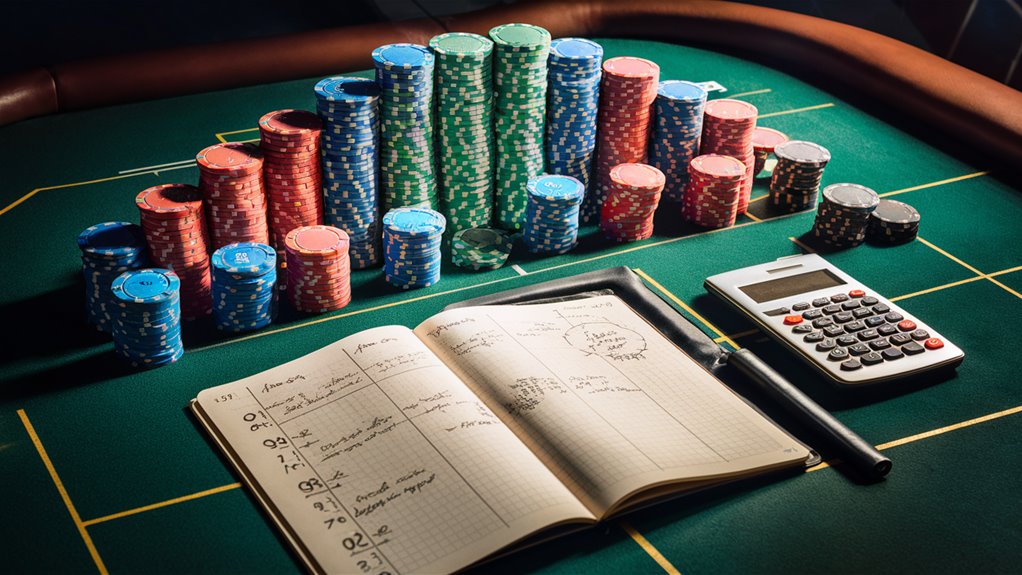Calculated Confidence: Essential Mental Tools for Strategic Gambling
Developing calculated confidence in gambling requires mastering both psychological resilience and statistical comprehension. Through extensive research and analysis, I’ve identified the critical mental frameworks that transform uncertain betting decisions into strategic gambling choices.
Building a Professional Gambling Mindset
Statistical understanding forms only part of successful gambling strategy. The true differentiator lies in developing an unshakeable mental framework that combines probability analysis with emotional control. Professional gamblers maintain composure during high-stakes situations by implementing proven psychological techniques alongside mathematical calculations.
Key Mental Tools for Strategic Betting
The foundation of fearless gambling rests on three core pillars:
- Probability mastery: Understanding mathematical odds at an intuitive level
- Emotional regulation: Maintaining composure during high-pressure decisions
- Risk management: Implementing systematic betting strategies based on bankroll size
Frequently Asked Questions
Q: How can I develop better emotional control while gambling?
A: Practice mindfulness techniques, establish strict betting limits, and maintain detailed records of decisions and outcomes.
Q: What role does bankroll management play in gambling confidence?
A: Proper bankroll management creates a safety buffer that reduces emotional stress and enables more rational decision-making.
Q: How can I improve my probability calculations during live betting?
A: Study basic probability theory, practice quick mental math, and develop standardized calculation methods for common betting scenarios.
Q: What separates professional gamblers from amateur players?
A: Professionals maintain strict discipline, focus on long-term results, and base decisions on statistical evidence rather than emotions.
Q: How long does it take to develop calculated confidence in gambling?
A: Building genuine confidence typically requires 6-12 months of consistent practice and systematic application of proven betting strategies.
Understanding Probability and Risk Assessment

Understanding Probability and Risk Assessment in Gaming
Core Probability Concepts
Probability analysis in gaming revolves around three fundamental elements: likelihood, odds, and expected value.
These mathematical concepts form the foundation for making informed decisions based on statistical analysis rather than emotional impulses.
Understanding these elements enables the development of effective strategies and risk management techniques.
Calculating Basic Probabilities
Statistical analysis begins with mastering fundamental probability calculations:
- Card probability: 1/52 for drawing a specific card
- Roulette odds: 47.37% chance for single-number bets
- Complex combinations: Multiple outcome scenarios in games like blackjack
Advanced Risk Assessment Strategies
Implementing effective bankroll management requires integrating probability calculations with systematic risk evaluation. This approach includes:
- Calculating optimal bet sizes
- Monitoring risk-reward ratios
- Maintaining strict bankroll limits
- Analyzing game-specific variables
Frequently Asked Questions
Q: What’s expected value in gaming?
A: Expected value represents the mathematical return anticipated over time, calculated by multiplying potential outcomes by their probabilities.
Q: How does probability affect bankroll management?
A: Probability calculations determine optimal bet sizing and help establish risk limits for responsible bankroll management.
Q: What’re the most important probability concepts for beginners?
A: Basic outcome likelihood, odds ratios, and fundamental probability calculations form essential starting points.
Q: How can probability knowledge improve gaming decisions?
A: Understanding probability enables data-driven decisions, reducing emotional betting and improving long-term results.
Q: What role does risk assessment play in probability-based gaming?
A: Risk assessment helps balance theoretical probability advantages against practical bankroll considerations for sustainable gaming strategies.
Managing Your Bankroll Effectively

Effective Bankroll Management for Responsible Gaming
Setting Up Your Bankroll Structure
Bankroll management begins with establishing a structured funding approach and clear limitations.
The optimal strategy involves dividing total gaming funds into session-based units, maintaining strict control by limiting individual bets to 1-2% of the total bankroll. This calculated methodology prevents significant losses while promoting rational decision-making.
Implementing Stop-Loss and Win Goals
Strategic bankroll protection requires implementing firm stop-loss limits and profit targets.
When reaching predetermined loss thresholds, immediately cease gaming activities. Similarly, achieving win goals demands disciplined session termination to secure profits. This systematic approach eliminates emotional betting patterns and preserves bankroll integrity.
Recording and Analysis
Comprehensive bet tracking and detailed record-keeping form the foundation of successful bankroll management.
Maintaining thorough documentation enables identification of betting patterns and strategic refinement. Establish a dedicated gambling fund separate from personal finances to maintain clear financial boundaries.
Understanding Mathematical Expectations
Factor the house edge into all calculations when determining expected losses. This mathematical approach ensures informed decision-making and realistic expectations regarding bankroll fluctuations.
#
Frequently Asked Questions
Q: What percentage of my bankroll should I risk per bet?
A: Limit individual bets to 1-2% of your total bankroll to ensure longevity and risk management.
Q: How do I set effective stop-loss limits?
A: Establish predetermined loss thresholds before each session and strictly adhere to them regardless of circumstances.
Q: Should I keep separate gambling funds?
A: Yes, maintain a dedicated gambling bankroll separate from personal finances to ensure proper boundaries.
Q: How detailed should bet tracking be?
A: Record every bet, including amount, type, outcome, and session details for comprehensive analysis.
Q: What role does the house edge play in bankroll management?
A: Understanding the house edge helps calculate expected losses and guides realistic bankroll allocation decisions.
Emotional Control Under Pressure

Mastering Emotional Control in High-Pressure Situations: A Comprehensive Guide
Understanding Emotional Control Under Pressure
Emotional intelligence and stress management form the cornerstone of peak performance under pressure.
While technical skills provide the foundation, emotional control ultimately determines decision quality in high-stakes situations.
Research shows that even highly skilled professionals can make critical errors when emotions override rational thinking.
Proven Techniques for Emotional Regulation
The 3-Breath Reset Method
The “3-breath reset” technique serves as an immediate intervention for mounting pressure. This method involves taking three deliberate, deep breaths while consciously acknowledging current emotional states. This creates essential cognitive space between emotional triggers and responses, preventing impulsive actions.
Setting Pre-Defined Boundaries
Implementing strict stop-loss limits before engaging in high-pressure activities provides crucial structural support for emotional control. These predetermined boundaries eliminate emotionally-charged decision-making during critical moments, ensuring rational choices prevail.
Advanced Emotional Management Strategies
Emotional detachment from immediate outcomes represents a critical skill for maintaining composure under pressure. Success requires viewing results as data points rather than personal reflections, focusing instead on long-term strategic objectives.
#
Frequently Asked Questions
Q: How can I prevent emotional decisions under pressure?
A: Implement the 3-breath reset technique and establish clear boundaries beforehand.
Q: What’re the signs of emotional distress during high-pressure situations?
A: Watch for increased anxiety, personal attachment to outcomes, and difficulty maintaining objective focus.
Q: How often should I take breaks during intense situations?
A: Take brief breaks whenever emotional intensity interferes with clear thinking.
Q: Can emotional control be improved with practice?
A: Yes, emotional regulation is a skill that strengthens through consistent application and mindful practice.
Q: What role does preparation play in emotional control?
A: Thorough preparation builds confidence and reduces anxiety in high-pressure situations.
Recognizing Cognitive Biases

Understanding and Overcoming Cognitive Biases in Decision Making
Common Cognitive Biases and Their Impact
Cognitive biases fundamentally affect decision-making processes across all domains of life.
These systematic patterns of deviation from rationality can significantly impact judgment and choices, leading to suboptimal outcomes. Understanding these mental shortcuts becomes crucial for making better, more informed decisions.
The Gambler’s Fallacy
The gambler’s fallacy represents one of the most pervasive cognitive biases in probability assessment.
This bias manifests when individuals incorrectly believe that independent events are influenced by previous outcomes. Each random event maintains complete independence, regardless of historical patterns or recent results.
Confirmation Bias and Its Effects
Confirmation bias emerges when decision-makers actively seek information supporting their existing beliefs while disregarding contradictory evidence.
This selective attention to confirming data can reinforce incorrect assumptions and lead to flawed analysis of situations.
Understanding Outcome Bias
Outcome bias occurs when individuals evaluate decisions based solely on their results rather than the quality of the decision-making process itself.
A positive outcome doesn’t necessarily validate the decision-making process, just as negative results don’t automatically indicate poor judgment.
#
Frequently Asked Questions
Q: How can cognitive biases be identified?
A: Cognitive biases can be identified through self-awareness, systematic review of decision-making processes, and regular evaluation of thought patterns.
Q: What’re effective strategies for overcoming confirmation bias?
A: Actively seek contradictory evidence, consult diverse perspectives, and maintain a skeptical approach to information that confirms existing beliefs.
Q: How does outcome bias affect decision-making?
A: Outcome bias can lead to overemphasis on results rather than process quality, potentially reinforcing poor decision-making patterns.
Q: Why is understanding the gambler’s fallacy important?
A: Understanding the gambler’s fallacy prevents misconceptions about probability and helps maintain rational decision-making in uncertain situations.
Q: What role does awareness play in managing cognitive biases?
A: Awareness serves as the first defense against cognitive biases, enabling individuals to recognize and counteract these mental shortcuts actively.
Practical Strategies for Bias Mitigation
Implementing structured decision-making frameworks, maintaining detailed decision journals, and regularly reviewing outcomes objectively can help mitigate the impact of cognitive biases.
These practices enhance rational thinking and improve overall decision quality.
Setting Clear Boundaries

Setting Clear Boundaries in Gambling: A Professional Guide
Establishing Core Gambling Boundaries
The establishment of clear gambling boundaries serves as a critical foundation for responsible 먹튀검증 gaming practices and effective bankroll management.
Setting specific, non-negotiable limits before initiating any gambling session enables optimal control and prevents emotion-driven decisions.
Three essential boundaries require implementation: time management, financial limitations, and emotional wellness controls.
Key Boundary Components
Time Management
Implementation of strict time boundaries proves essential for maintaining control. Utilizing a mobile device timer helps enforce predetermined session lengths, preventing extended play periods that could lead to fatigue-based decisions.
Financial Controls
Bankroll protection demands both loss limits and win targets. Physical separation of gambling funds from personal accounts ensures adherence to preset financial boundaries. Critical practices include:
- Setting concrete loss limitations
- Establishing clear win targets
- Maintaining separate gambling funds
- Restricting access to additional money during sessions
Emotional Parameters
Emotional boundary setting requires identification of personal triggers and development of corresponding control mechanisms. Key indicators for session termination include:
- Elevated stress levels
- Anxiety manifestation
- Loss-chasing behavior
- Emotional decision-making patterns
Boundary Documentation and Enforcement
Documentation of established boundaries through digital means ensures consistent accessibility. Mobile applications provide ideal platforms for boundary reference and enforcement tracking.
## Frequently Asked Questions
1. How do I determine appropriate time limits for gambling sessions?
Consider personal schedules, energy levels, and prior gambling patterns to establish sustainable time frames.
2. What percentage of bankroll should be allocated for single sessions?
Industry standards suggest limiting single-session exposure to 1-5% of total gambling bankroll.
3. How often should gambling boundaries be reviewed?
Monthly evaluation of boundary effectiveness ensures continued relevance and protection.
4. What strategies help maintain emotional boundaries?
Regular self-assessment, mood tracking, and session journaling support emotional boundary adherence.
5. Should boundaries differ between online and physical gambling venues?
Yes, venue-specific boundaries account for environmental factors and accessibility differences.
Learning From Past Decisions

Learning from Past Investment Decisions: A Strategic Analysis Framework
Understanding Decision Analysis
Systematic analysis of past investment decisions provides essential insights for developing robust future strategies.
Implementing a detailed investment journal creates a foundation for tracking key metrics, including:
- Performance outcomes
- Market conditions
- Strategic reasoning
- Emotional factors
- External influences
Strategic Documentation Process
Recording and analyzing investment decisions requires a structured approach. The most effective method involves:
- Comprehensive documentation of each transaction
- Objective evaluation of market conditions
- Risk assessment frameworks
- Performance metrics tracking
- Strategy alignment verification
Critical Success Factors
Focus on these key elements when reviewing past decisions:
- Market timing considerations
- Risk management effectiveness
- Strategy adherence
- External factor analysis
- Outcome evaluation
FAQs
Q: How often should investment decisions be reviewed?
A: Conduct monthly reviews of individual decisions and quarterly portfolio assessments.
Q: What key metrics should be tracked?
A: Track returns, risk ratios, strategy alignment, market conditions, and decision rationale.
Q: How can emotional bias be identified in past decisions?
A: Compare decisions against predetermined criteria and identify deviations from established strategies.
Q: What documentation format works best?
A: Use a structured digital format that includes quantitative data and qualitative analysis.
Q: How can lessons learned be effectively implemented?
A: Create actionable guidelines based on analysis findings and incorporate them into future decision frameworks.
Implementing Lessons Learned
Transform analysis into actionable insights by:
- Creating clear decision criteria
- Establishing performance benchmarks
- Developing risk management protocols
- Building systematic review processes
- Implementing feedback mechanisms
Success in market analysis comes from rigorous evaluation of past decisions and systematic implementation of learned insights.
Building Strategic Patience

Building Strategic Patience in Trading and Investment
The Foundation of Strategic Patience
Strategic patience represents a critical success factor in market participation and investment performance.
Disciplined trading requires resisting impulsive decisions and maintaining a calculated approach focused on long-term wealth building rather than quick profits.
Developing Entry and Exit Criteria
Clear trading parameters form the cornerstone of strategic patience:
- Entry criteria: Specific market conditions that must align before executing trades
- Exit points: Predetermined profit targets and stop-loss levels
- Risk management rules: Position sizing and portfolio allocation limits
Time Management and Analysis Framework
Implementation of structured analysis periods enhances strategic discipline:
- Fixed market review schedules
- Dedicated research windows
- Position monitoring intervals
## Frequently Asked Questions
Q: How do I maintain patience during volatile markets?
A: Focus on predetermined trading rules and avoid emotional reactions to short-term price movements.
Q: What’s the optimal timeframe for developing strategic patience?
A: Commit to a minimum 6-12 month period of consistent practice and systematic trading.
Q: How can I prevent impulsive trading decisions?
A: Establish a detailed trading plan and require multiple confirmation signals before entering positions.
Q: When should I adjust my patience threshold?
A: Review and adjust parameters during scheduled strategy evaluations, not during active trading sessions.
Q: What tools support strategic patience development?
A: Utilize trading journals, market analysis software, and systematic trading frameworks to maintain discipline.
Advanced Implementation Strategies
Integrate these advanced patience-building techniques:
- Performance metrics tracking
- Regular strategy validation
- Risk-adjusted return analysis
- Portfolio rebalancing schedules
Common Questions
How Can I Tell if a Casino Is Rigging Their Games?
How to Verify if a Casino Is Running Fair Games
Key Signs of a Legitimate Casino Operation
A casino’s licensing and regulatory compliance serves as the primary indicator of fair gaming practices. Reputable gaming authorities like the Malta Gaming Authority, UK Gambling Commission, and Nevada Gaming Control Board enforce strict standards through:
- Regular technical audits
- Random Number Generator (RNG) testing
- Payout percentage verification
- Equipment inspections
Technical Verification Methods
I recommend looking for these critical verification elements:
- eCOGRA certification
- GLI testing certification
- Published RTP (Return to Player) rates
- Transparent game rules and odds
- Independent auditor reports
Red Flags of Potentially Rigged Games
Warning signs that may indicate unfair gaming practices:
- Unlicensed operation
- Missing regulatory information
- Undisclosed RTP rates
- Poor reputation in player forums
- Delayed or refused payouts
Frequently Asked Questions
Q: How can I check a casino’s license?
A: Visit the casino’s footer section and verify their license number with the relevant gaming authority’s public database.
Q: What is a fair RTP percentage?
A: Most legitimate slots offer 94-97% RTP, while table games typically range from 97-99%.
Q: Are online casinos more likely to be rigged than land-based ones?
A: Not necessarily, if they’re properly licensed and regulated. Both types must meet strict fairness standards.
Q: How often are casino games tested?
A: Licensed casinos undergo monthly to quarterly testing by independent agencies for game fairness and RNG accuracy.
Q: What should I do if I suspect rigged games?
A: File a complaint with the licensing authority and document all suspicious activity with screenshots and transaction records.
What’s the Best Time of Day to Gamble for Maximum Wins?
Best Time to Gamble: Understanding Casino Win Rates
Casino success relies on understanding probability, not timing. While some players believe certain hours offer better chances, the mathematical reality proves otherwise. Here’s what every player needs to know about casino timing and winning potential.
The Truth About Casino Timing
Random number generators (RNGs) and fixed mathematical probabilities govern all casino games, operating consistently 24 hours a day. These systems ensure that winning odds remain constant regardless of when someone chooses to play.
Peak vs. Off-Peak Hours
While timing doesn’t affect odds, different hours offer distinct gaming experiences:
- Peak Hours (6 PM – 2 AM)
- More energetic atmosphere
- Higher table minimums
- Crowded gaming floors
- Off-Peak Hours (6 AM – 2 PM)
- Quieter environment
- Lower minimum bets
- More personal attention from dealers
Optimal Playing Conditions
The best time to gamble depends on personal preferences:
- Mental alertness
- Bankroll management
- Crowd comfort level
- Table availability
Frequently Asked Questions
Q: Do casinos pay out more at certain times?
A: No, payout rates remain consistent due to regulated RNG systems.
Q: Are morning hours better for winning?
A: Win rates stay constant throughout the day.
Q: Do slots hit more often late at night?
A: Slot machines maintain the same odds 24/7.
Q: Is weekend gambling more profitable?
A: Game odds don’t change on weekends versus weekdays.
Q: Do holiday periods offer better winning chances?
A: Casino probabilities remain unchanged during holidays.
Do Lucky Charms and Rituals Actually Improve Gambling Outcomes?
The Truth About Lucky Charms and Gambling Outcomes: A Scientific Analysis
Understanding the Role of Superstition in Gambling
Lucky charms and gambling rituals have no mathematical impact on gambling outcomes. While these practices remain deeply embedded in casino culture, they cannot influence the fundamental probability mechanisms that govern games of chance. Statistical probability and random number generation determine results, regardless of personal rituals or lucky items.
The Psychology Behind Gambling Superstitions
Psychological comfort plays a significant role in why gamblers rely on lucky charms. These items may:
- Boost confidence levels
- Reduce anxiety
- Create a sense of control
- Provide emotional support
Scientific Evidence and Mathematical Reality
Research consistently demonstrates that gambling outcomes operate on:
- Fixed mathematical probabilities
- Predetermined house edges
- Random number generators
- Statistical variance
Common Gambling Superstitions and Their Effects
Popular gambling rituals include:
- Lucky clothing items
- Specific number combinations
- Timing-based behaviors
- Physical gestures
FAQ Section
Q: Can lucky charms improve my chances of winning?
A: No, lucky charms cannot affect mathematical probabilities or random outcomes.
Q: Why do professional gamblers use rituals?
A: Rituals provide psychological comfort but do not influence actual results.
Q: Do casino games respond to lucky items?
A: Casino games operate on fixed mathematical principles unaffected by external items.
Q: Can positive thinking change gambling outcomes?
A: While positive thinking may improve decision-making, it cannot alter game mathematics.
Q: Are some gambling rituals more effective than others?
A: No gambling ritual can influence random probability or game outcomes.
Making Informed Gambling Decisions
Focus on mathematical strategy, bankroll management, and understanding odds rather than relying on superstition. Success in gambling comes from knowledge and disciplined play, not magical thinking.
Which Gambling Games Have the Highest Winning Potential for Beginners?
Best Gambling Games for Beginners: Winning Potential Guide
Top Casino Games with Favorable Odds
For those new to casino gaming, blackjack and baccarat stand out as optimal choices due to their favorable mathematical advantages. In blackjack, implementing basic strategy reduces the house edge to approximately 1%, while baccarat maintains a modest 1.06% house advantage on banker bets.
Blackjack Advantages
- Lowest house edge among casino table games
- Learnable strategy through practice
- Clear decision-making framework
- Consistent winning potential with proper play
Baccarat Benefits
- Simple betting structure
- Minimal strategy required
- Low house advantage on banker bets
- High-limit potential for experienced players
Strategic Game Selection Tips
Beyond these primary options, consider:
- Video poker (0.46% house edge with perfect play)
- Craps (1.36% on pass line bets)
- Three-card poker (3.37% house edge)
## Frequently Asked Questions
Q: Which casino game offers the best odds for beginners?
A: Blackjack offers the best odds when using basic strategy, with only a 1% house edge.
Q: Is baccarat difficult to learn?
A: No, baccarat is one of the simplest casino games with minimal strategy required.
Q: How long does it take to learn basic blackjack strategy?
A: With dedicated practice, basic blackjack strategy can be mastered in 2-3 weeks.
Q: What is the safest bet in baccarat?
A: The banker bet offers the lowest house edge at 1.06%.
Q: Should beginners play slot machines?
A: While accessible, slot machines typically have a higher house edge (2-15%) compared to table games.
Should I Follow Other Successful Gamblers’ Betting Patterns to Improve Results?
Should You Follow Other Successful Gamblers’ Betting Patterns?
Following successful gamblers’ betting patterns may seem tempting, but I strongly advise against this approach for several critical reasons. Responsible gambling requires personalized strategy development based on individual circumstances and capabilities.
Why Copying Other Gamblers Is Risky
Each bettor faces unique circumstances that influence their gambling decisions:
- Different bankroll sizes and management requirements
- Varying risk tolerance levels
- Distinct betting goals and objectives
- Personal knowledge of specific markets
- Individual time constraints and availability
Developing Your Own Strategy
Instead of copying others, focus on:
- Building fundamental knowledge of betting markets
- Understanding odds calculation and probability
- Creating a sustainable bankroll management system
- Tracking and analyzing personal betting results
- Setting realistic goals based on your situation
Key Considerations for Personal Strategy
- Risk Assessment: Evaluate personal financial limits
- Market Selection: Choose areas where you have expertise
- Time Management: Develop a schedule that fits your lifestyle
- Record Keeping: Document all bets and outcomes
- Continuous Learning: Study and improve betting knowledge
Frequently Asked Questions
Q: Can’t I learn from successful gamblers?
A: While observing successful gamblers can provide insights, blindly copying their bets ignores crucial personal factors.
Q: What about tipsters and betting groups?
A: Professional tipsters may offer valuable analysis, but their recommendations should inform, not replace, personal decision-making.
Q: How do I start developing my own strategy?
A: Begin with thorough market research, small stakes, and careful tracking of results.
Q: Is it better to focus on one sport or market?
A: Specializing in one area often yields better results than spreading across multiple markets.
Q: How long does it take to develop a successful strategy?
A: Building a reliable betting strategy typically requires months of learning and adjustment.
